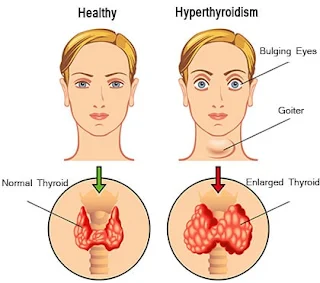Hyperthyroidism and dental treatment protocol
Hyperthyroidism and dental treatment protocol
Increase secretion of thyroid hormones (T3, T4) in
the circulation that can lead to thyroid crisis
Signs and symptoms of thyrotoxicosis:
1. Increased apatite and loss of weight
2. Warm moist skin
3. Irritability and nervousness
4. Fine tremors and muscle weakness
5. Increased cardiac output, pulse rate and blood pressure
6. Tachycardia
7. Dyspnea on exertion
8. Exophtalmous
Dental Management Considerations (Prevention of
thyroid crisis) :
1. Medical Consultation
2. Postpone surgery until thyroid dysfunction is well
controlled (1-2 months after controlling the case)
3. Stress reduction protocol
4. Avoid the use of vasoconstrictor
i. Use plain anesthesia
ii. Use local anesthesia with vasoconstrictor other than Adrenaline / Noradrenaline
5. Avoid Atropine as it may lead to thyroid crisis
Thyroid Crisis
Thyroid storm is an emergency condition associated with untreated hyperthyroidism, and is caused by a hypermetabolic state.
Early symptoms of thyroid crisis
1. Restlessness
2. Nausea
3. Abdominal cramps
Late symptoms of thyroid crisis
1. High fever
2. Tachycardia
3. High pulse rate with severe hypotension
4. Tachypnea due to pulmonary oedema
5. Coma and heart failure
Management of thyroid crisis:
1. Urgent call for medical aid
2. Cold packs to decrease temperature
3. Oxygen
4. Cardiopulmonary resuscitation
5. 100-300 mg hydrocortisone IV
6. Anti-thyroid medications e.g. potassium iodide or
200 mg propranolol
7. IV fluid as a supportive measures













Comments